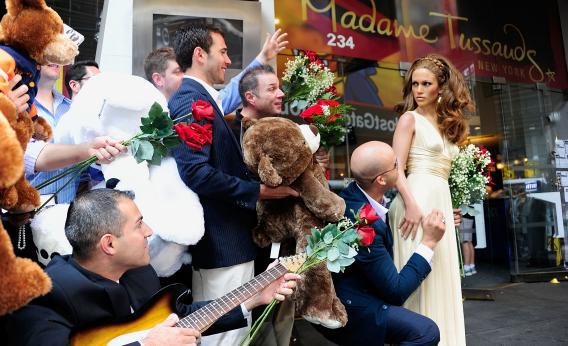This piece about the shifts in marriage and dating patterns by Kate Bolick at the Atlantic has some interesting ideas in it, but she makes you pay for these ideas by only bringing them up after forcing you to swim through a sea of unquestioned assumptions and straight up fallacies: that evolutionary psychology is a real science instead of 21st century phrenology, that 40-year-old men are uniformly disinterested in dating women their own age, that singleness is mainly a product of women wanting men more successful than themselves, that the whole nation looks like New York City’s notoriously brutal dating marketplace, that there’s a meaningful difference between a woman who terminates a long-standing cohabitation and a divorcée, and that Susan Walsh should be treated like an expert in dating when she’s better described as a charlatan whose only credential for giving advice is her shockingly sadistic misogyny (and who likes to diagnose feminists from afar as mentally ill because they question her immoveable belief that dating is really a war between men and women in which each tries to extract what they want from the other with as minimal contribution of love or sex as possible, depending on the gender stereotype). Even the interesting idea at the end of her piece, which is that women deal with the scarcity of decent men that are marriageable by shoring up their relationships to each other, feels weak and mealy-mouthed. It made me long for some saber-rattling radical lesbian separatism that, while not my cup of tea personally speaking, at least has conviction.
I remain skeptical of the idea that the surge in numbers of single women has anything to do with women’s successes and/or men’s failures. Bolick interviews one genuine expert in her piece, historian Stephanie Coontz, but neglects to mention Coontz’s research showing that educated, successful women are more, not less, likely to be married and stay married. If you stop framing dating as some sort of competition between men and women and instead see it as a collaborative enterprise, another theory for the decline of marriage comes into view: Maybe marriage just isn’t working for people anymore. Just because someone isn’t married doesn’t mean they’re alone, after all. Maybe we don’t need to come up with replacements for marriage, because it’s possible that marriage is declining because people have already started to turn to replacements such as cohabitation, serial monogamy, and having a friend-family instead of a traditional nuclear family. I imagine the soaring gaps in wealth between the haves and have-nots are probably the primary reason for the decline of marriage; since marriage is primarily about allocating resources in a family, people who live paycheck to paycheck have no real need for it. If I died today, the only thing I’d leave behind for a legally bound husband to inherit would be my two cats, and frankly, I think my family would not interfere with his taking possession of them.
What’s interesting about these non-stop media musings about how women are getting to be “too good” for men—again, disproven by the research!—is that one specific area where women probably are getting pickier about who they date is getting overlooked. Call it the “feminism gap,” if you will; as women gain more economic power and self-esteem, their willingness to put up with a bunch of crap from men is declining rapidly. We see this in ways big and small, including the fact that women are more likely to sue for divorce than men and some research indicates that the “hook-up culture” that causes so much anguish may have partially developed as a way for women to get laid without going through demeaning and sexist romantic rituals. My favorite statistic regarding this surge of women being able to ask more of men and of life: the rate of women murdering their husbands has declined dramatically in the past 30 years, which is largely a direct result of women leaving men who beat them earlier in the relationship, long before the abuse reaches the point where they feel their only escape is to kill their abuser. I think women are beginning to have higher standards for how they’re treated in a relationship, and while many men have caught up, there are probably more women who won’t tolerate sexist treatment than men who are willing to stop being sexist. Give it a generation, and I bet it evens out significantly. Already the divorce rate is going down, suggesting that a lot more men are embracing the mutual-respect model of marriage than they did a generation ago, when a sea of marriages cracked under the pressure of trying to shove modern people into traditional patriarchal marriage.
One more thought: I would have never thought of myself as a hopeless romantic, but reading endless sad, dry articles about the “marriage market,” where people supposedly assess each other like you would a car purchase (“No, I was really holding out for something with a sunroof and post-college degree of some sort”) certainly makes me wonder whatever happened to plain old love. Partnering up is portrayed in this article, and in many like it, as the acquisition of a person-object who functions to stave off loneliness and keep others from perceiving you as pathetic. There’s very little discussion of that ultimate taboo in American discourse, pleasure. I don’t recall when in my current relationship I whipped out a checklist and scored to see if my boyfriend got a 75 percent or higher. Maybe it’s foolish of me to go about it this way, but my primary memories of why I wanted him in my life were that I just really enjoyed his company. I can’t be alone in this—people tend to couple up because they’ve done something wild like fall in love, right?—so why is that a marginalized part of the discussion?
